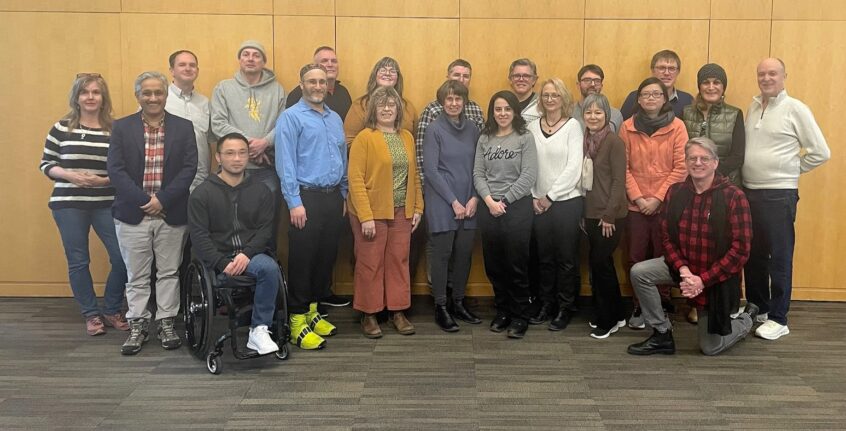Referring patients to VCH’s Spiritual Care and Multi-faith Services professionals when they are in a spiritual crisis is a no brainer. The trick is knowing how to identify that.
“Spirituality is often misunderstood, and it can be difficult to recognize whether a certain type of distress being expressed is spiritual in nature, but I will be happy to expand on this,” said Spiritual Health Profession Leader Philip Murray.
What is spirituality?
Philip refers to a definition of spirituality that was spearheaded by Dr. Christina Puchalski, an international leader in the movement to integrate spirituality into health care. The definition she and her colleagues settled on is:
Spirituality is a dynamic and intrinsic aspect of humanity through which persons seek ultimate meaning, purpose and transcendence, and experience relationship to self, family, others, community, society, nature, and the significant or sacred. Spirituality is expressed through beliefs, values, traditions and practices.
Philip comments that while this is a wordy definition, it encompasses the concept. He would add emotions to the last line as our emotional expressions can be sourced in that connection to our core self.
“I appreciate that the definition was put together under the leadership of physicians who wanted a definition that they can hold onto,” he said.
How to recognize spiritual distress?
If a patient—or perhaps yourself or a colleague—is asking why something is happening in their life or why God is allowing something to happen, they may be experiencing a spiritual crisis.
“If people have lost their sense of purpose and are struggling to find it or identify it, that can be an indication of spiritual distress,” said Philip. “Other signs include expressions of unworthiness like, ‘I deserve this,’ ‘this is my punishment,’ or they may simply be exceptionally withdrawn or angry. If they are isolated or disconnected from any support structures that can lead to an experience of distress.”
How to access spiritual care for patients
Spiritual Care and Multi-Faith Services staff members are onsite at all three Vancouver Acute facilities (VGH, UBCH and GF Strong) as well as a person connected with the Vancouver Community palliative care program and another with the Home Health program and some of VC’s long-term care homes.
Within Vancouver Acute, staff are members of the inter-professional care teams.
“If there’s a sense that there’s something spiritual going on or a spiritual need, medical staff can send in a referral through Cerner and we can come, introduce ourselves to the patient, explain who we are and our services and our support, and get consent for the visit,” explained Philip. “One of the things we find is that spirituality is often equated with religion. While religion can be an integral aspect of a person’s spirituality, and enabling access to religion is part of what we do, spirituality is much more than just religion. It’s an understandable misunderstanding of who we are and our role and the type of support we provide. We find it best if we’re able to explain who we are and to connect with patients face to face. If the patient is in a site or the community where there isn’t a practitioner available and we’d be called in to do it, probably logistically it would be best to phrase something along the lines of, ‘You seem to be struggling with some issues or challenges that might be spiritual in nature. We have someone at VCH who could help you with that. Would you like us to call them in?’”
If you have a patient situation where you are unsure if the concerns are spiritual, Philip encourages you to reach out. You can talk through the situation with spiritual care staff to try to determine if it is a spiritual situation.
How to access spiritual care for yourself?
Spirituality is a component of wellness and can help us guard against stress and burnout. The scope of practice for spiritual health professionals in BC is outlined by the Ministry of Health in a document called the Spiritual Health Framework. Their role in the health-care system is to support spiritual health and well-being for patients, families and staff, including physicians.
“Ideally you would already know a spiritual care practitioner on your team and could reach out to them,” said Philip. “We don’t have a referral system set up for staff care. But if you were to send an email to spiritualcare@vch.ca and say you’re looking for some support, I would get back to you.”
The main office for Spiritual Care and Multi-faith Services is on the second floor of the Doctors Residence at VGH (2775 Heather Street). Philip says odds are good that if you drop by during the day someone will be there who can help.
The service is anonymous; records are kept in regard to workload measurements, but no notes or personal information of staff/physicians supported are kept. Philip can share that about five to 10 per cent of VCH spiritual practitioners’ time is spent supporting staff.
“Moral distress comes up and touches something within us,” said Philip. “Staff needs were higher during the pandemic and in some areas, such as the ICU, our practitioner spends closer to 40 per cent of his time supporting staff during that period. We absolutely welcome requests for support from staff and physicians.”
Photo: Members of VCH’s spiritual care team.




